#tsar paul i
Text
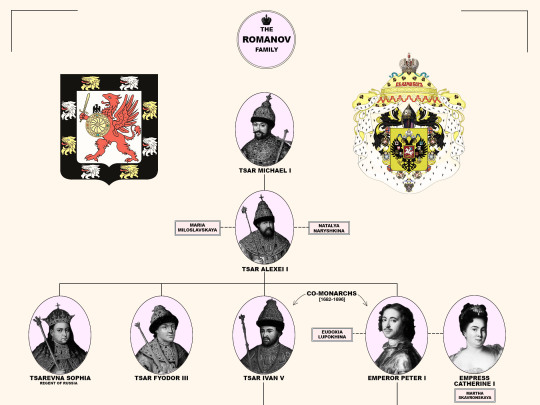
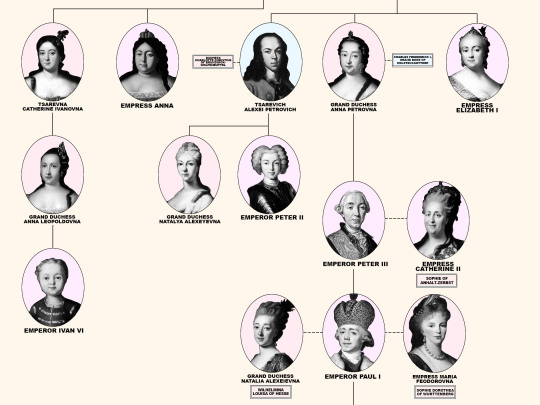
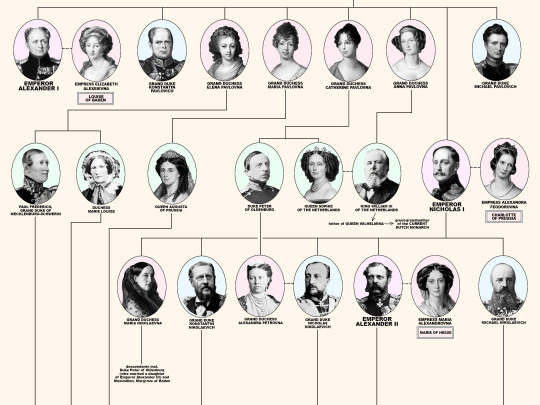
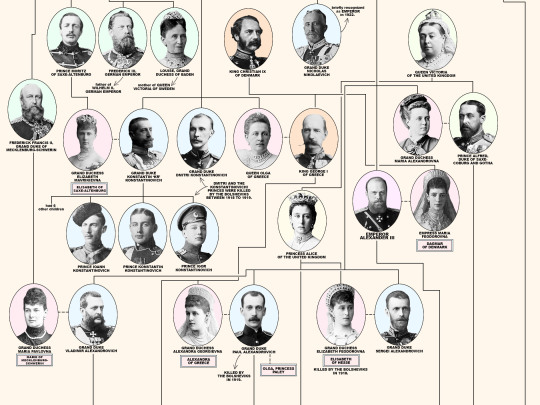
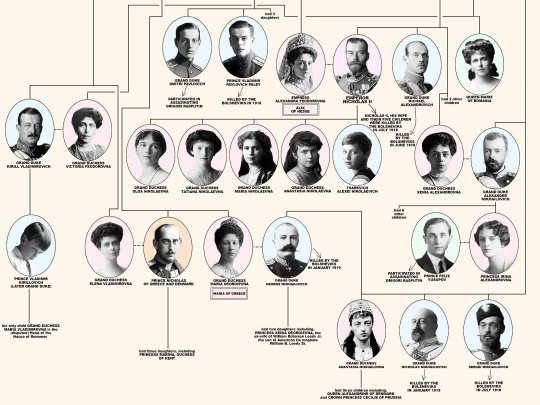
Members of the House of Romanov, the last reigning Dynasty of Russia.
From the first Romanov Russian Tsar Michael I (reigned 1613-1645) until the last Emperor Nicholas II (reigned 1894-1917). Including the 18 members of the house executed from 1918 until 1919; Grand Duke Michael Alexandrovich (13 June 1918). Nicholas II, Empress Alexandra Feodorovna, Grand Duchesses Olga Nikolaevna, Tatiana Nikolaevna, Maria Nikolaevna, Anastasia Nikolaevna, and Tsarevich Alexei Nikolaevich (17 July 1918). Grand Duchess Elizabeth Feodorovna, Grand Duke Sergei Mikhailovich, Prince Ioann Konstantinovich, Prince Konstantin Konstantinovich, Prince Igor Konstantinovich, and Prince Vladimir Paley (18 July 1918). Grand Duke Paul Alexandrovich, Grand Duke Dmitri Konstantinovich, Grand Duke Nicholas Mikhailovich, and Grand Duke George Mikhailovich (28 January 1919).
#romanovs#history#nicholas ii#alexandra feodorovna#olga nikolaevna#tatiana nikolaevna#maria nikolaevna#anastasia nikolaevna#alexei nikolaevich#myedits#peter i#peter ii#Peter iii#peter iii#Catherine the great#tsar alexei i#tsar michael#tsar paul i#alexander i#alexander ii#alexander iii#nicholas i#ancestry
273 notes
·
View notes
Text

And he wasn’t even wrong
#memes#my memes#Napoleon#Tsar Paul I#Paul I of Russia#napoleon bonaparte#history memes#napoleonic era#napoleonic#Russia#France#first french empire#french empire#history#coalition wars
56 notes
·
View notes
Text

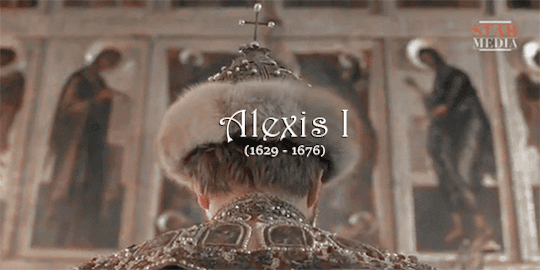


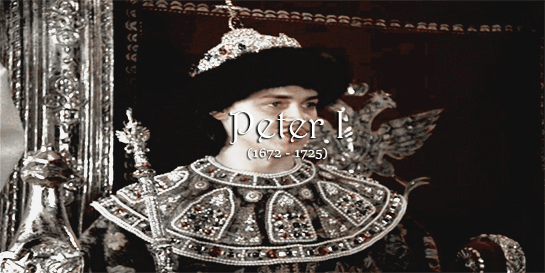
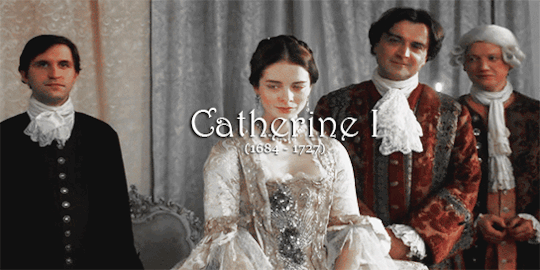
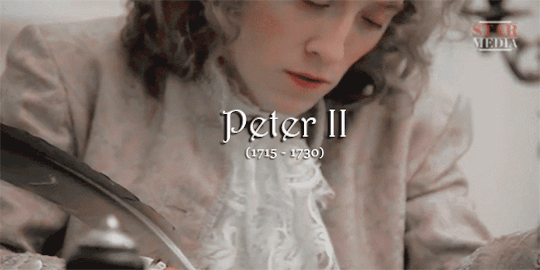

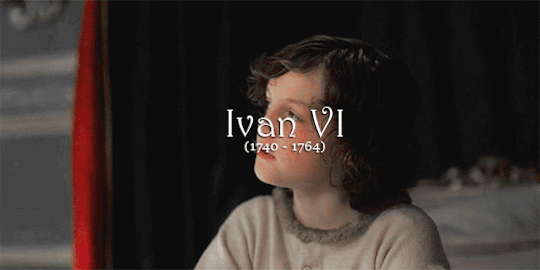


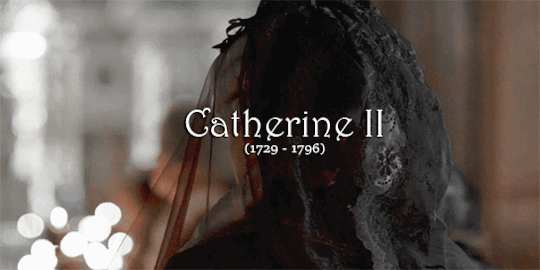
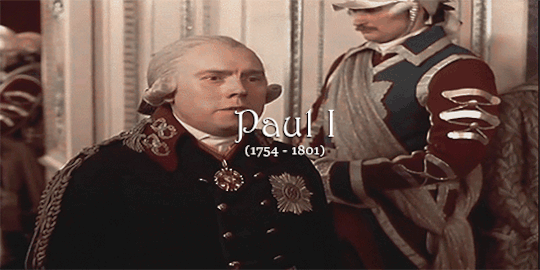
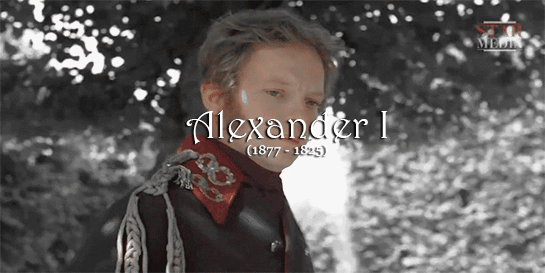
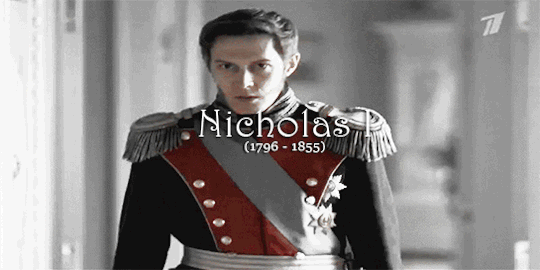


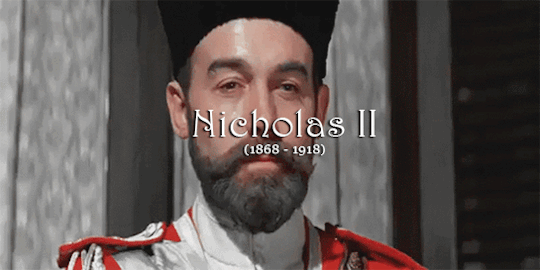
"Over the centuries, the Empire has grown in size and in the number of conquered peoples. It once possessed an area equivalent to one-sixth of the globe, stretching from the Pacific to the German border, on which the sun never set and which was ruled by an autocrat Tsar who owed satisfaction only to God."
The last tsars - a brief untold history about the Romanovs | Paulo Rezzutti.
(Loose translation)
#tsar#tsarina#facts#romanovs#russian history#the romanovs 2013#tsar michael i#tsar alexei i#tsar nicholas ii#catherine the great#tsar paul i#tsar peter ii#tsar peter iii#peter the great#tsarina elizabeth#tsarina catherine i#tsar alexander ii#tsar alexander iii#tsar alexander i#tsar nicholas i#tsar ivan v#tsar ivan vi#tsarina anna#tsarina anna i#tsarina elizabeth i#nicholas and alexandra 1971#zvezda imperii 2008#poor poor paul#roman imperatora 1994#delo dekabristov
183 notes
·
View notes
Text
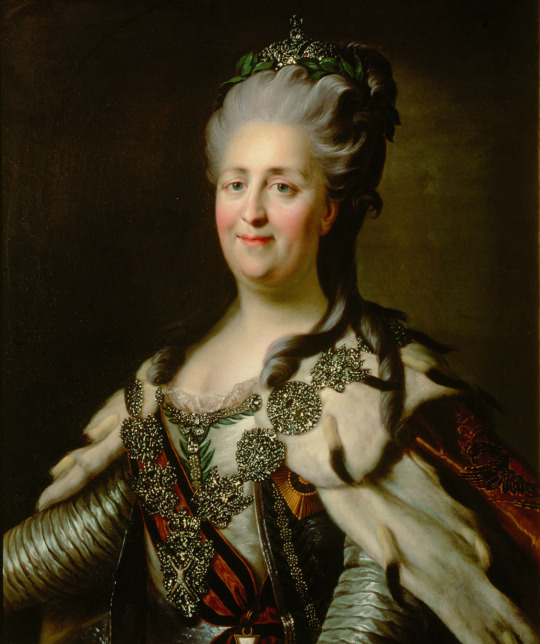
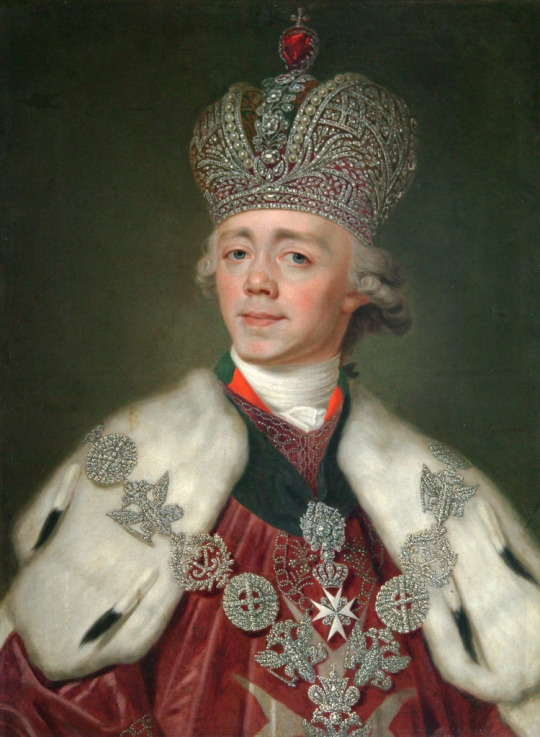


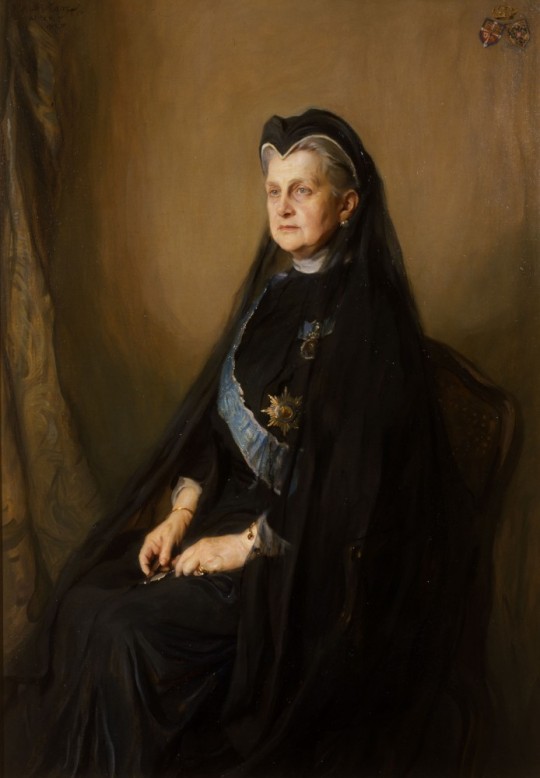

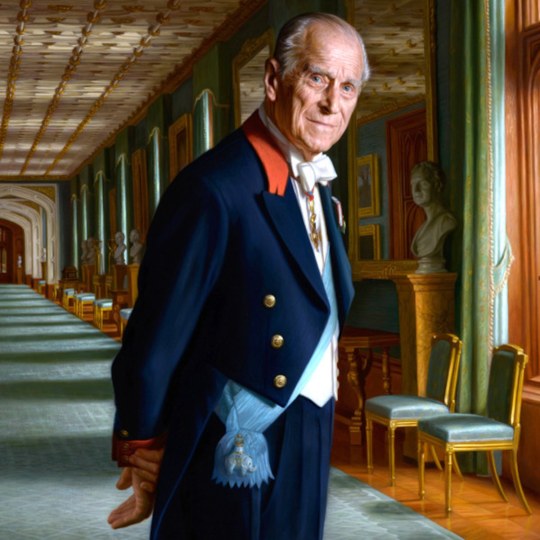

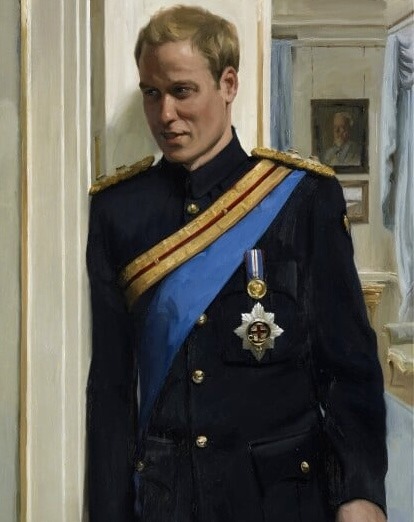
Catherine II the Great, Empress of Russia: 6th great-grandmother of The Prince of Wales.
Catherine II of Russia -> Paul I of Russia -> Nicholas I of Russia -> Grand Duke Konstantin Nikolayevich of Russia -> Olga Constantinovna, Queen consort of Greece -> Prince Andrew of Greece and Denmark -> Prince Philip, The Duke of Edinburgh -> King Charles III of GB -> The Prince of Wales.
#ktd#british royal family#prince william#brf#throwback#king charles lll#prince philip#catherine the great#the great#empress of russia#russian imperial family#tsar Paul I#Paul I#greek royal family#art#art history#history#european royalty
43 notes
·
View notes
Text
Paul I after sighning the new Law of Succession: Finally, no more women on the Russian throne! A reign of logic and reason will begin for the XIX century!
Alexander I:

#I love you Paul but you eldest son is a petty vengeful bitch#ok I’m struggling through reading about thr last years of his reign abd his stupid Holy Union#tsar alexander i#paul I of russia#paul i
62 notes
·
View notes
Text
March is very fruitful for death of tyrants
(5 March - Stalin; 15 March - Caesar)
13 notes
·
View notes
Text
The Lost Grand Duchesses part 2: Alexandra Pavlovna
When she was born at 7:40 in the morning in 1783, the baby Grand Duchess Alexandra Pavlovna was instantly viewed as second class. Her grandmother, Catherine II ‘the Great’, wrote “I infinitely more like boys than girls”, and told her staff that she found the newborn to be very ugly. She called the baby “a very ugly creature.” This dislike of Alexandra continued into her toddler years, when Catherine continuously compared the young Alexandra to her baby sister, insisting that little Elena was much more charming and intelligent than Alexandra.
Despite this, Alexandra adored her grandmother, who wrote that the little girl would do “anything just to please me.” Alexandra and Elena were painted together as a gift to Catherine, and the two little girls lovingly hold up and caress a diamond encrusted miniature portrait of their grandmother.

By the age of four, Alexandra’s education had begun, and her intelligence in languages (being fluent in four) and writing made Catherine finally pay more attention to her, but for entirely different reasons.
As soon as the little girl turned eleven, Catherine wrote that the little girl who loved to dance, draw, and play music, was now to be “considered an adult”, and be made to marry. “It is time for the older one to get married” she concluded, not even mentioning Alexandra’s name.
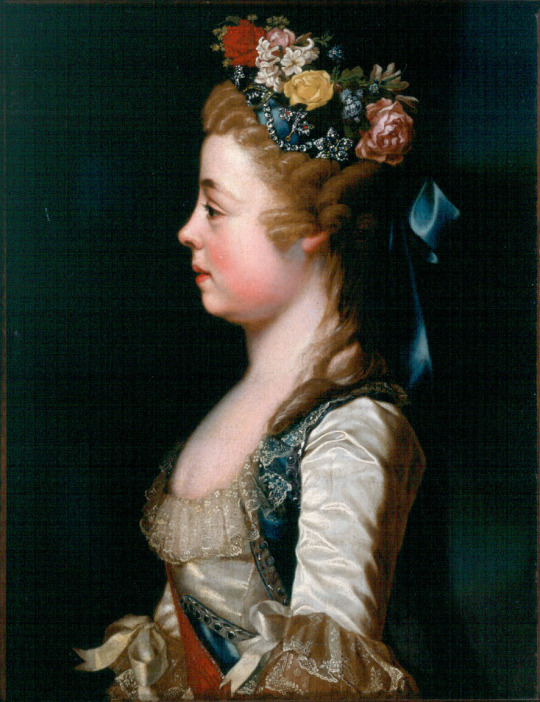
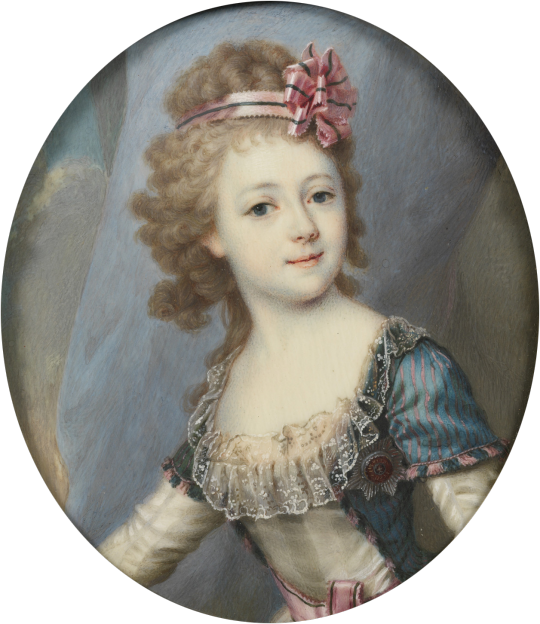
A long and embarassing debacle followed, in which the child was left at the alter. Catherine admitted that the young girl, not yet a teenager, often adopted a “confused look” when having to meet with potential husbands, and did not want to speak to them.
Catherine died in 1797, temporarily putting Alexandra’s fate in limbo. She returned to her daily life as an unmarried girl, and even published anonymous articles that she had translated in French under the pseudonym ‘A’. However, in 1799, the prospect of an Austrian-Russian alliance was apparently too attractive to pass on, and the thirty-year-old Archduke Joseph of Austria, the Palatine of Hungary, travelled to Russia to meet the thirteen-year-old Alexandra.
The marriage was finalised, and Alexandra was forced to leave Russia - and her family - in order to move to Hungary with her new husband. Joseph wrote a letter to his brother in which he stated he was “convinced that with this marriage my domestic bliss is assured for the entirety of my life.”
Alexandra, on the other hand, was miserable. Countess Varvara Golovina, a lady at court and potential lover of the Tsarina Elizaveta Alexeievna, wrote in her memoirs that Alexandra was sad, and did not want to be forced to leave Russia. Her father, Pavel I, constantly said that he would “not see her again” and that she was “being sacrificed.” Despite this, Pavel could have prevented the marriage at any time. A single lock of golden hair fashioned into a flower was all that she left behind.


Although Alexandra was popular in Hungary among all classes, she was deeply depressed. Her friendly and charming personality had been replaced by a new temperament which was “always serious and sad”. Alexandra especially did not get on well with her mother in law, the Empress Maria Theresa of Hungary, who was intensely jealous of the young girl’s popularity. Maria Theresa intentionally antagonised the teenager, and sought to treat her badly.
In 1800, Alexandra fell pregnant, and was struck with health problems. Her mother-in-law ordered the hiring incompetent doctors (known to her to be incompetent) and insisted that the doctors obey her orders, rather than present their own educated solutions. Orders from Maria Theresa included cooking meals which Alexandra would not be able to eat, making her weak and frail.
In March 1801, Alexandra gave birth to a little girl, named Alexandrine of Austria. The pregnancy and labour had been incredibly difficult, and the baby sadly passed away within a few hours of birth. Alexandra, depressed at having been forcibly taken from her home and after having to endure cruel treatment by her mother-in-law, said: “Thank God that my daughter was now with the angels, without experiencing the miser that we are exposed to.”
Alexandra contracted puerperal fever. The doctors misdiagnosed her poor health after the birth several times, treating her for gastric diseases and typhoid rather than ‘childbed’ fever. She succumbed to the disease aged just seventeen years old.
Alexandra was not buried until two years after her death due to disagreements in the Catholic Austrian court over where to bury a Russian Orthodox. In 1981, thieves broke into Alexandra’s Mausoleum, looting her coffin and taking jewellery and clothing from her remains. Due to the vandalism, she was reburied with the deceased wives and children of her husband in the crypt of Buda Castle, which went against her wishes to be buried in an Orthodox Church. In 2004, she was reburied at the Üröm Mausoleum, in a small park surrounded by a moat. Inside the tomb, Orthodox icons line the walls, a reflection of Alexandra’s beloved faith, and her deep connection with Russia, which endured even after being “sacrificed”.
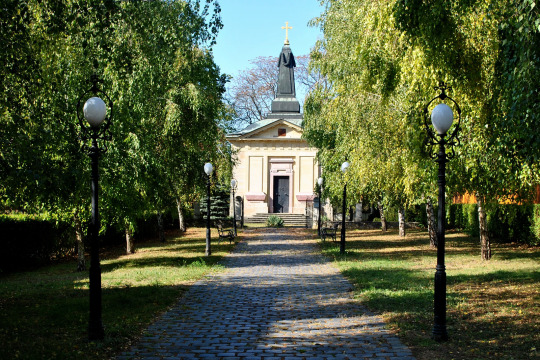
#the lost grand duchesses#alexandra pavlovna#what happened to her was so preventable#they just didn't love daughters enough to care#1700s#1800s#womens history#romanov#romanov family#russian history#hungarian history#pavel i#paul i#tsar paul#get the tissues out#justice for alexandra#the alexandra curse
14 notes
·
View notes
Text

Welcome to the Russian Period Dramas Bracket everyone! The order of things will look something like this:
Polls will start posting tomorrow. One group (A, B, C, D) will be posted per day, starting with Group A. Polls will run for a week. Once all polls for a round close, polls for the following round will begin posting within 24-48 hours (depending on mod availability). You may send in asks with “propaganda” if you wish.
Round 1 matches are listed out below for a full text version. Note that titles are listed in the format: English tittle (official/”official”* or translated) | transliterated title. (*There are occasionally some variations in what is the “official” English title. I tried my best here, usually prioritizing what is used by a major streaming service or wiki).
GROUP A
Ekaterina: The Rise of Catherin the Great | Ekaterina (2014) vs. Pushkin: the Last Duel | Pushkin: Poslednyaya duel (2006)
The Barber of Siberia | Sibirskiy tsiryulnik (1998) vs. Tchaikovsky's wife | Zhena Chaikovskogo (2022)
The Duelist | Duelyant (2016) vs. Life of a Mistress | Volnaya gramota (2018)
Catherine the Great | Velikaya (2015) vs. Poor Nastya | Bednaya Nastya (2023)
Detective Anna | Anna – detectiv (2016) vs. Gardes-marines Ahead! | Gardemariny, vperyod! (1988)
Bloody Lady | Krovavaya Barinya (2018) vs. Institute For Noble Maidens | Institut blagorodnykh devits (2010)
Union of Salvation | Soyuz spaseniya (2019) vs. Star of Captivating Happiness | Zvezda plenitelnogo schastya (1975)
Russian Ark | Russkiy kovcheg (2002) vs. Poor Poor Paul | Bednyy bednyy Pavel (2003)
GROUP B
The Silver Skates | Serebryanyy konki (2020) vs. Sins of Our Fathers | Grekhi ottsov (2004)
Bezsonov (2019) vs. Voskresensky (2021)
Sunstroke | Solnechnyy Udar (2014) vs. The Fall of the Empire | Gibel imperii (2005)
Matilda (2017) vs. Gloomy River | Ugryum-reka(2021)
The Road To Calvary | Hozhdenie po mukam (2017) vs. How the Steel Was Tempered | Kak zakalyalas stal (1973)
Admiral (2008) vs. Quiet Flows the Don | Tikhiy Don (2015)
Morphine | Morphiy (2008) vs. Battalion | Batalyon (2015)
Rasputin | Grigoriy R (2014) vs. Christmas Trees 1914 | Yolki 1914 (2014)
GROUP C
War and Peace | Voyna I mir (1966) vs. The Queen of Spades | Pikovaya dama (1982)
Pechorin (2011) vs. A Hero of Our Time | Geroy nashego vremeni (2006)
Eugene Onegin | Yevgeny Onegin (1959) vs. A Cruel Romance | Zhestokiy romans (1984)
Gogol (2017) vs. The Idiot | Idiot (2003)
Anna Karenina: Vronsky’s Story | Anna Karenina. Istoriya Vronskogo (2017) vs. Anna Karenina (2009)
Crime and Punishment | Prestuplenie i nakazanie (2007) vs. Brothers Karamazov | Bratya Karamazovy (2009)
Fathers and Sons | Ottsy i deti (2008) vs. Lady Into Lassie | Baryshnya krestyanka (1995)
Two Women | Dve zhenshchiny (2014) vs. The Emperor’s Love | Lyubov imperatora (2003)
GROUP D
Sophia (2016) vs. The Youth of Peter the Great | Yunost Petra (1980)
Furious | Legenda o Kolovrate (2017) vs. Alexander: The Neva Battle | Aleksandr. Nevskaya bitva (2008)
Viking (2016) vs. Iron Lord | Yaroslav: Tysyachu let nazad (2010)
The Terrible | Groznyy (2020) vs. Tsar (2009)
Godunov (2018) vs. Schism | Raskol (2011)
Land of Legends | Serdtse Parmy (2022) vs. Golden Horde | Zolotaya Orda (2018)
Conquest | Tobol (2019) vs. Secrets of the Palace Revolutions | Tayny dvortsovykh perevorotov (2000)
Elizabeth | Elizaveta (2022) vs. Cathedral | Sobor (2021)
#russian period dramas#russian period dramas bracket#tumblr bracket#tumblr polls#period dramas#perioddramaedit#russian tv#russian movies#russian media
16 notes
·
View notes
Text
The Firebird - Chapter 6

Pairing: Prince Paul (Catherine the Great) x OFC, Fairytale AU
Summary: When Paul, a spoiled young prince, spots a strange bird in the forest near his palace, he impulsively chases after it, hoping to both escape from and prove himself to his disapproving mother. Thus he is plunged into an exhilarating adventure across a magical realm populated by enchanted princesses, dangerous monsters, and powerful wizards, an adventure that may change him more than he can ever imagine.
Chapter warning: none
Chapter word count: 3.4k
Chapter 1 - Chapter 2 - Chapter 3 - Chapter 4 - Chapter 5
Chapter 6 - The Tsar's Quest
At close quarters, Tsar Afron's castle was as sumptuous as it was from afar. Though it was constructed of wood like the rest of the town, the carvings were a lot more intricate, draping like lace along the roofs, running down columns and banisters, surrounding windows and doors like decorations on a marzipan cake, and painted so they stood out against the rich brown log walls and shone even in the twilight. Every roof peak was topped with a gilded weathervane or an ornament in the shape of a horse. The inside was even more resplendent, with walls and ceilings painted in the brightest shades or covered in the richest tapestries, all illuminated by the light from hundreds of gold chandeliers. And everywhere was the image of horses, in every configuration and pose, carved into the wood or painted in gold. Paul, used as he was to the splendor of the palaces of Saint Petersburg, had to remember to close his mouth lest he drooled at all this opulence and looked even more like a fool than he already did.
Not that he had much of a chance to take it in. After Zhara's demonstration on the pasture, the soldiers wasted no time bringing them to Tsar Afron, and now he had to scurry to keep up with their long strides down the many corridors of the castle. To make things worse, the soldiers had been too frightened to rebind Zhara's hands, but had neglected to untie him, so he was forced to march with his hands behind his back like a common criminal. He didn't dare complain. He could feel Zhara's anger coming off her like a heat wave, and he was afraid that wave would burn him to a crisp on the spot if he so much as opened his mouth.
He had been a fool, he knew. Yes, he could try to blame Zhara for not trying harder to warn him, or even blame the horse for moving toward him first, but at the end of the day, he was the one that had decided to steal the horse. He was the one that had gotten them into this mess. Somehow, in this strange land with its strange, bewildering rules, Paul was finding it increasingly difficult to ignore his own fault.
The commander stopped in front of a door covered in so much carving and gilding that it hurt Paul's eyes, and instructed them to wait. Zhara seemed to have simmered down a little, so Paul cleared his throat and turned to her, hoping to get back into her good graces with something he'd never uttered—an apology. "Listen, I'm—"
"No, you listen," she interrupted, a finger pressed into his chest, hot enough to burn through his shirt. "Once we are in front of the tsar, do not speak. Do not make a sound. I don't want to hear so much as a peep from you. I shall handle the talking, and if you still wish to see your precious Rus' again, you shall follow my lead. Do you understand?"
Paul was quite certain his shirt was starting to smoke and scorch. There was nothing else he could do but nod. At that moment, the door opened, and they were ushered into the throne room. It was more magnificent than the rest of the castle combined, all crimson walls painted with gold vines, gilded window frames, and, on a raised platform, framed by a red velvet tapestry, stood a pure gold throne flanked by two gold horses, where Tsar Afron was seated.
For all the equine imagery around the castle, Paul had expected the tsar to be something of a Tartar, but the man he saw was rather weedy and colorless, with pale skin, thin hair of an indeterminate shade, a downturned mouth that gave him the look of a sulky child, and eyes that were watery blue under one light and gray under another. Those eyes squinted inquisitively as Paul and Zhara were led into the room. Zhara dropped a curtsey. Paul, following her lead, sketched an awkward bow.
"Lady Zhara," Afron said in a wheezing voice. "Forgive me this rather unfortunate welcome, but I was told that you were a fugitive..."
"No, my lord, it is I that must beg forgiveness," Zhara said. "What you heard is not true"—and here she gave a brief summary of the story she'd told Paul and of their goal to find Baba Yaga. "We were on our way to ask for your help," she continued, "but my—companion here was worried that the horse would not take to us and decided to introduce himself." That was a rather clever way of explaining their presence in the pasture without admitting that they had been trying to steal the horse. "It was an honest mistake. We never meant to disrespect you."
Afron let out a deep sigh. "I, too, have heard disturbing reports from Arthania that match your story," he said. "Had you come to me first, I would have done my utmost to help you put an end to your brother's reign of terror." Paul could feel Zhara's glare boring a hole into the side of his head, and he hung his head in shame.
"But," the tsar continued, "the truth of the matter is, you did disrespect me, by entering my land and putting your hand on my most valuable property without permission. These trespasses ought to be severely punished."
Paul wanted to shout, The horse touched me first!, but he remembered Zhara's warning and kept his mouth shut.
"However, out of respect for your late honorable father, I shall excuse you, if you perform a certain service for me." The tsar said this in an oily voice that reminded Paul of the way the soldiers had leered at Zhara, causing him to bristle. Well, if Afron insisted on behaving the same way as his men, then Paul would have to speak up, regardless of Zhara's wrath. He would allow no one to talk to a lady that way.
Zhara asked warily, "And what service would that be, my lord?"
"Bring me back Tsarevna Elena the Fair."
Afron's request didn't come as a complete surprise to Paul. It was how it happened in the tale. The question was, did it happen this way because it was in the tale, or because he, knowing the tale, had inadvertently caused it to happen...? It hurt his head to think about it, so Paul stopped thinking about it.
Zhara frowned. "Tsarevna Elena of Bryansk, you mean?"
"Do you know of any other tsarevna of the same name?" Afron replied, his eyes turning dreamy as he looked at a spot somewhere in the distance. "For so long I have loved her with my whole body and soul, but her mother, Tsarina Kostroma, is proud and rejects my suit. The Horse with the Golden Mane will be yours, if you can bring me Elena's hand in marriage."
The lustful look on the tsar's face made Paul feel quite sick, and he saw Zhara's lips curl in barely concealed distaste. Then she set her mouth in a resigned line. "As you wish, my lord," she said, inclining her head. "If you would be so kind as to provide us with some supplies, we shall be on our way presently."
"Presently?" Afron said, surprised. Paul glanced at Zhara in dismay. It had been several long days, and he was rather hoping for some rest and proper food. Well, he supposed he should have thought of that before deciding to steal the horse.
"Time is of the essence, my lord," Zhara said. "We cannot delay."
"Very well," Afron said. "I shall have my servants prepare for your trip."
He clapped, and a string of servants appeared to replace the soldiers in leading Paul and Zhara out. Once they were safely away, Paul held Zhara back, out of the servants' earshot.
"What's the rush?" he asked. "I would've liked to sleep in a bed for one night at least."
"You don't deserve to sleep in a bed," she hissed, not looking at him. "You deserve to rot in Afron's dungeon!"
"Fine, leave me here then! I'm done trailing after you!"
"Perhaps I should."
She sounded rather serious, which made Paul stop short in his track. He hadn't considered the possibility that she might really leave him, and it filled him with trepidation. She was the only one who knew he was a stranger in this world; what would happen if he angered a leshy or a rusalka or one of the many strange creatures that roamed this land and she wasn't there to warn or shield him?
"You're not going to, are you?" he said plaintively. "I know I should have listened to you..."
She turned and examined his sheepish face for a moment or two, her eyes softening.
"Well, I guess someone ought to keep an eye on you," she said. Paul gave her an uncertain smile, which, strangely enough, seemed to fluster her. "Just so you wouldn't wander around trying to be a hero!" she snapped, before turning and following the servants down the corridor.
Despite Zhara's refusal to stay the night, Afron still insisted on treating them as honored guests. Paul soon found himself luxuriating in a hot bath in the tsar's personal bathhouse. It was heavenly, except for a startling moment when he again caught a glimpse of another green-skinned creature covered in birch leaves, but it quickly disappeared. He then had his shoulder wound redressed with some sort of herbal poultice and was given a new suit of clothes in the old style, before Peter the Great introduced European fashion to Russia, made of the finest fabric and beautifully embroidered. His own clothes were cleaned, and even his wig was carefully brushed and set aside for him. Paul hesitated to put it back on—it did not go with the old-fashioned clothes, making him look like the Fool of his mother's court—but he felt naked without it, so he wore it anyway.
"Wow" was all Zhara uttered when he rejoined her outside the dining room. The bath seemed to have lifted her mood. She had changed into nicer clothes as well—a snow-white chemise, a red sarafan embroidered in gold, a gold headdress studded with pearls and rubies, and a string of coral beads around her slender neck. But for all the regal air they gave her, her sarcastic, impish grin remained the same.
"Stop it," Paul said sullenly, tugging at the upstanding collar of his shirt. "I look like an imbecile."
"No, you look like you would fit right in with the Lukomorians," she said, her eyes twinkling. "Even with that ridiculous wig." Her teasing only made Paul scowl and ram the wig more tightly onto his head, out of contrariness.
They entered the dining room and sat down to a scrumptious supper. It was nothing like the feasts that Paul was used to in his mother's court—the food was simpler and heartier—but the taste was incomparable. He was so busy stuffing his face that it took him a while to notice Afron was asking him something. He looked up, bewildered.
"I say, are you a knight at the court of the late Tsar Artyom?" the tsar said.
Paul gave Zhara a panicked look, not knowing how to answer.
"No," she smoothly interjected. "He's—a court jester."
"A court jester!" Afron exclaimed, looking rather offended at having to share his table with a fool. Paul, too, stared daggers at Zhara and opened his mouth to protest. She gave his leg a swift kick under the table.
"Yes, my father's favorite," she said. "And he has been most loyal and attentive to me since my flight from Arthania, so I thank you, my lord, for rewarding him with your kindness and generosity."
Afron's thunderous expression dissipated, and once more, Paul had to reluctantly admit that Zhara's quick wit had saved them.
"That explains his outlandish dress and manners then," Afron said. "But, my lady, will you be safe traveling with a jester as your only companion? I am quite worried for your safety."
Though clearly not worried enough to offer your soldiers as protection, Paul noted.
"Oh no, I trust him with my life," Zhara was quick to say. Paul glanced at her to see if she was speaking in earnest or not, but her face was turned toward the tsar, and her side profile gave nothing away. He looked down again, feeling rather hollow. It was likely that she said that simply to avoid raising Afron's suspicion.
After supper, Zhara insisted on departing right away. Afron saw them to the castle's front door, where their mounts and supplies were waiting. Upon seeing the animals, Paul almost shouted out in indignation and had to bite his tongue to keep quiet. Zhara, who seemed to see nothing wrong with them, curtseyed to Afron, thanked him, and promised to return soon with Elena the Fair's hand in marriage. They then mounted the animals and rode out of the fortress, under the light of a full moon.
It was only when they had gone far enough that Paul made his displeasure known.
"Donkeys!" he exclaimed. "I bet he has a stable full of horses, and he gave us two donkeys! What a miserly little—"
"Donkeys are perfectly good animals," Zhara said calmly. "Besides, horses are no good for us where we're going."
That sounded ominous. "Why? Where are we going?"
"There." She nodded toward the mountain range in the distance. "Perun's Crown." Paul had only given it a passing glance that afternoon, and now, his stomach dropped to see how far it spread out, a veritable wall of silver and crystal under the moonlight, stretching as far as the eyes could see, with peaks so high they were lost in the clouds, and so steep they were like knives cutting through the night sky.
"Elena the Fair lives up those mountains?" Paul asked, his voice coming out squeakier than he'd intended.
"No, don't be silly. Her kingdom is behind those mountains. But the quickest way is to go through them. And these donkeys are experts in crossing mountains. So stop your complaining and keep up."
***
It took them three days to reach the mountains. By the second day, Paul realized that Zhara had been right about the donkeys. The ground was becoming rougher, with almost no discernible path, yet the donkeys picked their way through the rocks as surefooted as walking through a level field.
Though Zhara still took care to hide under Paul's cloak during the day, they met very few people on their way. During the first two days, they traveled with some convoys of merchants, but one by one, these convoys all turned right as they neared the mountains and followed the river instead, and they were on their own.
"It may be easier traveling along the river, but for us, it is safer this way," Zhara said when they stopped on the second night by a rock outcrop, the mountains looming above them like some giant, ancient god. "We don't want to draw more attention to ourselves than we already have." She had changed out of her finery and was back into a coarse linen chemise and dark blue sarafan.
"Do you think your brother is tracking you?" Paul asked.
"I don't know. He may use the victims he has transformed into animals, like poor Alyosha, but that takes a lot of strength from him, so he is going to focus on protecting his death. He knows he only has to bide his time; I shall have to confront him sooner or later." She wrapped her arms around her knees and hugged them close to her body, her eyes fixed on their fire. "Besides, I wasn't just talking about me." She nodded at Paul meaningfully. "I didn't wish to stay at Tsar Afron's castle for longer than necessary because I didn't want him to start asking about you."
That reminded Paul of a question that had been bothering him for some time. "About that—how come you know I'm from Rus, but others don't?"
"Those of us with magic in our blood can always tell," she replied. "I don't know how to explain it—we simply know. Be thankful that the rest of Lukomorye do not have such ability."
"Is that... bad?"
"Anything from Rus' is a great curiosity here. If they knew who you are, they would descend on you like a pack of wolves. How would you like to be paraded around like some exotic creature, to be ogled at?" She smiled at Paul's horrified look. "I suppose it would be the same if I ended up in your world."
"It might be worse," he said. "You might be burned as a witch, even though that practice had been outlawed for a century now." Now it was his turn to grin at her.
Zhara laid her head on her knees and regarded him with interest. "What is it like, your world?" she asked.
Paul thought about it for a while. "It's—like here, but different," he said lamely. He did not know how to put into words the otherworldly feeling that constantly coursed through him ever since he set foot in this land. "The trees, the mountains, the river, even the people... they're all similar, but back in my world, they're more—dull, solid, while here, there is this air about them... I can't describe it. It's the same with how you can tell me from a Lukomorian, I suppose. It's—"
"—magic?" Zhara prompted.
It wasn't quite what he had in mind, but it would have to do. "Yes, magic," he agreed. A strange little smile flitted across Zhara's face. She said nothing more and went back to watching the flames.
They arrived at the foot of the mountains on the third day. There was a stone-built shelter there, and Paul and Zhara found themselves in the company of an old man, who said his name was Simeon, and that he was placed there to aid travelers in their crossing. He gave the donkeys some hay and stoked the fire to make tea, while Zhara opened the supplies Afron had given them and shared their food with him.
"It's been months, nay, close to a year, since I had anyone passing through," Simeon said, biting into a hunk of cheese with relish. "They all follow the river these days. Even large groups avoid the mountains. It's odd that you two would take this route..."
"My mother lives in Bryansk," Zhara said. "She is very sick, and I must go to her as soon as possible." This was the story she and Paul had agreed on, should they meet another traveler.
"Well, you're traveling light, so I suppose you don't have much to worry about—except for those two donkeys—" The old man considered their packs and clothes with the eye of an expert.
"Worry about what?" Paul asked.
"Who, my lad, worry about who," Simeon corrected him. "Nightingale the Robber. You have heard of him, yes?"
Paul wracked his brain for the old stories. "The one with the deadly whistle?" he asked.
"The very one. He has staked out these mountains as his own. His nest is on Perun's Peak, and he perches there, whistling down mountain passes, blowing men and animals against the rock. Many merchants have had their entire stock of goods and their animals taken, so now they just avoid these mountains altogether. And even then, those that stray a little too close to them may still be in danger."
Paul looked at Zhara and met her worried returning glance.
"Perhaps we should—" he began, but she shook her head.
"No," she said firmly. "It's going to take months to go around, and who knows what my—what might have happened to my mother by then." She glared at Paul briefly, giving him a silent warning to say no more.
Later, after Zhara had settled down on the narrow bed in a corner of the hut, Simeon clapped Paul on the shoulder. "Listen to your missus, my lad," the old man said. Paul's cheeks flamed. Though he and Zhara had agreed to pose as husband and wife, the idea still made him feel oddly shy. "I know you're worried about Nightingale, but trust me, having a wife and a mother-in-law angry with you is worse," Simeon continued in a friendly tone. "Why do you think I stay out here in this stone hut even when there's no traveler?" Chuckling, the old man climbed on the stove to sleep, leaving Paul to make himself comfortable by the fire.
Chapter 7

Taglist: @ali-r3n
#prince paul#tsarevich paul#catherine the great#prince paul fic#prince paul x ofc#joseph quinn#joseph quinn fic
22 notes
·
View notes
Text
I saw the Napoleon movie at the cinema today and here are some of my thoughts (spoiler warning I guess?):
everything about this film was so unintentionally funny
not a single person was casted correctly (except for Vanessa Kirby as Josephine. I think she did a good job with a bad script)
I loved all the military uniforms
Paul Barras was so slay
can't believe that they had Junot at Toulon and didn't even include the iconic way that he met Napoleon
Thermidor was very lacklustre. I wish it had been more accurate to what actually happened because the real events were very dramatic
so sad that they erased Napoleon's friendship with Bonbon Robespierre. it would have made such a good tragic backstory
its weird how they include Napoleon and Josephine lying about their ages when they got married, but didn't state the reason why. because now it just looks like they were saying their actual ages.
Josephine's dogs were very cute, but I think that instead of having Napoleon play with one of the dogs there should have been a whole sequence of him being attacked by Fortuné every time Josephine turns her back
very sad at the Italian campaign erasure
I find it weird that Napoleon had short hair for Egypt and Brumaire because surely it would have made more sense for narrative purposes to have a scene of him cutting his hair short after becoming first consul to symbolise the change?
so mean of Napoleon to deny Junot his dessert
I'm actually so glad that Junot disappeared after Egypt because I doubt they would have been able to handle his mental illness and death with an appropriate amount of sensitivity
Brumaire was actually hilarious I was laughing so much when he fell down the stairs
thankfully there weren't as many cringy sex scenes as I thought there were from reading the reviews. but maybe that's because those scenes are in the directors cut and not the cinema version?
literally the only time we ever see Eugene and Hortense during Napoleon and Josephine's marriage is at the divorce. and they don't even say anything they just stand there looking awkward.
can't believe the iconic Tilsit kiss wasn't included
why was Tsar Alexander such a slutty Twink I'm not complaining though
Marie-Louise somehow looked like the exact opposite of historical Marie-Louise. the casting director wasn't even trying
poor Napoleon II only got about two seconds on screen time. come on after everything he went through he deserves at least one scene to play with his dad
can't believe they actually used the classic 'blue-grey Eastern Europe' filter on Russia
I am still laughing about how Napoleon said he wanted to spank Alexander
Waterloo felt so lacklustre for some reason? I feel like it should have been a lot more dramatic and theatrical to really convey how important the battle was
the bullet hole in Napoleon's hat at Waterloo looked so fake
WHY DID HE JUST FALL OF HIS CHAIR LIKE THAT AT THE END OF THE FILM LMAO
37 notes
·
View notes
Text

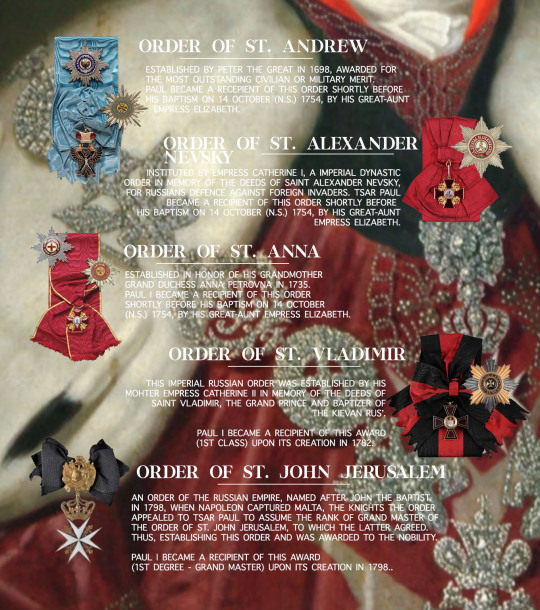
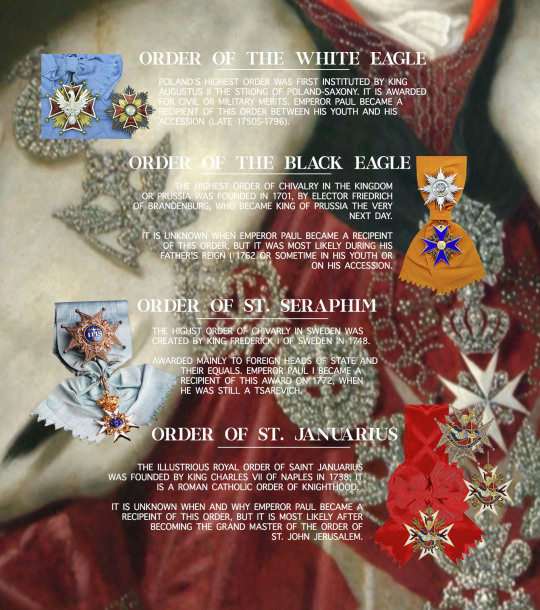

Orders and Medals → ᴇᴍᴘᴇʀᴏʀ ᴘᴀᴜʟ ɪ
Emperor Paul I of Russia, was recorded to have been a recipient of thirteen awards. Five nationals: Order of Saint Andrew, Order of Saint Alexander Nevsky, Order of Saint Anna, Order of Saint Vladimir and Order of the Saint John Jerusalem. And eight foreign: Order of the White Eagle (Poland), Order of the Black Eagle (Prussia), Order of Saint Seraphim (Sweden), Order of Saint Janarius (Naples), Neapolitan Constantine Order of Saint George (Naples), Neapolitan Order of Saint Ferdinand and Merit (Naples and Sicily), Order of the Holy Spirit (France), and Order of Our Lady of Carmel and Saint Lazarus of Jerusalem (France).
21 notes
·
View notes
Text
In Tsarist Russia, you can keep your job after killing the head of state, but then lose your job for moving a Christian icon.

*Palen was one of the conspirators of the assassination of Tsar Paul I, which Tsar Alexander was aware of.
#also sometimes spelled as Pahlen#Peter Ludwig von der Pahlen#Palen#tsar Paul I#tsar Alexander I#napoleonic era#napoleonic#history#1800s#quote#book pic#alexander kornilov#19th century Russia#dowager empress Marie#Alexander’s mother
20 notes
·
View notes
Text
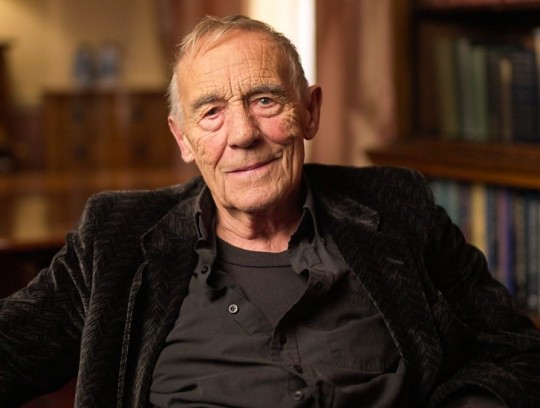
The actor Michael Jayston, who has died aged 88, was a distinguished performer on stage and screen. The roles that made his name were as the doomed Tsar Nicholas II of Russia in Franklin Schaffner’s sumptuous account of the last days of the Romanovs in Nicholas and Alexandra (1971), and as Alec Guinness’s intelligence minder in John Le Carré’s Tinker Tailor Soldier Spy on television in 1979. He never made a song and dance about himself and perhaps as a consequence was not launched in Hollywood, as were many of his contemporaries.
Before these two parts, he had already played a key role in The Power Game on television and Henry Ireton, Cromwell’s son-in-law, in Ken Hughes’s fine Cromwell (1969), with Richard Harris in the title role and Guinness as King Charles I. And this followed five years with the Royal Shakespeare Company including a trip to Broadway in Harold Pinter’s The Homecoming, in which he replaced Michael Bryant as Teddy, the brother who returns to the US and leaves his wife in London to “take care of” his father and siblings.
Jayston, who was not flamboyantly good-looking but clearly and solidly attractive, with a steely, no-nonsense, demeanour and a steady, piercing gaze, could “do” the Pinter menace as well as anyone, and that cast – who also made the 1973 movie directed by Peter Hall – included Pinter’s then wife, Vivien Merchant, as well as Paul Rogers and Ian Holm.
Jayston had found a replacement family in the theatre. Born Michael James in Nottingham, he was the only child of Myfanwy (nee Llewelyn) and Vincent; his father died of pneumonia, following a serious accident on the rugby field, when Michael was one, and his mother died when he was a barely a teenager. He was then brought up by his grandmother and an uncle, and found himself involved in amateur theatre while doing national service in the army; he directed a production of The Happiest Days of Your Life.
He continued in amateur theatre while working for two years as a trainee accountant for the National Coal Board and in Nottingham fish market, before winning a scholarship, aged 23, to the Guildhall School of Music and Drama in London, where he was five years older than everyone else on his course. He played in rep in Bangor, Northern Ireland, and at the Salisbury Playhouse before joining the Bristol Old Vic for two seasons in 1963.
At the RSC from 1965, he enjoyed good roles – Oswald in Ghosts, Bertram in All’s Well That Ends Well, Laertes to David Warner’s Hamlet – and was Demetrius in Hall’s film of A Midsummer Night’s Dream (1968), with Warner as Lysander in a romantic foursome with Diana Rigg and Helen Mirren.
But his RSC associate status did not translate itself into the stardom of, say, Alan Howard, Warner, Judi Dench, Ian Richardson and others at the time. He was never fazed or underrated in this company, but his career proceeded in a somewhat nebulous fashion, and Nicholas and Alexandra, for all its success and ballyhoo, did not bring him offers from the US.
Instead, he played Charles Lutwidge Dodgson (Lewis Carroll) in Alice’s Adventures in Wonderland (1972), a so-so British musical film version with music and lyrics by John Barry and Don Black, with Michael Crawford as the White Rabbit and Peter Sellers the March Hare. In 1979 he was a colonel in Zulu Dawn, a historically explanatory prequel to the earlier smash hit Zulu.
As an actor he seemed not to be a glory-hunter. Instead, in the 1980s, he turned in stylish and well-received leading performances in Noël Coward’s Private Lives, at the Duchess, opposite Maria Aitken (1980); as Captain von Trapp in the first major London revival of The Sound of Music at the Apollo Victoria in 1981, opposite Petula Clark; and, best of all, as Mirabell, often a thankless role, in William Gaskill’s superb 1984 revival, at Chichester and the Haymarket, of The Way of the World, by William Congreve, opposite Maggie Smith as Millamant.
Nor was he averse to taking over the leading roles in plays such as Peter Shaffer’s Equus (1973) or Brian Friel’s Dancing at Lughnasa (1992), roles first occupied in London by Alec McCowen. He rejoined the National Theatre – he had been Gratiano with Laurence Olivier and Joan Plowright in The Merchant of Venice directed by Jonathan Miller in 1974 – to play a delightful Home Counties Ratty in the return of Alan Bennett’s blissful, Edwardian The Wind in the Willows in 1994.
On television, he was a favourite side-kick of David Jason in 13 episodes of David Nobbs’s A Bit of a Do (1989) – as the solicitor Neville Badger in a series of social functions and parties across West Yorkshire – and in four episodes of The Darling Buds of May (1992) as Ernest Bristow, the brewery owner. He appeared again with Jason in a 1996 episode of Only Fools and Horses.
He figured for the first time on fan sites when he appeared in the 1986 Doctor Who season The Trial of a Time Lord as Valeyard, the prosecuting counsel. In the new millennium he passed through both EastEnders and Coronation Street before bolstering the most lurid storyline of all in Emmerdale (2007-08): he was Donald de Souza, an unpleasant old cove who fell out with his family and invited his disaffected wife to push him off a cliff on the moors in his wheelchair, but died later of a heart attack.
By now living on the south coast, Jayston gravitated easily towards Chichester as a crusty old colonel – married to Wendy Craig – in Coward’s engaging early play Easy Virtue, in 1999, and, three years later, in 2002, as a hectored husband, called Hector, to Patricia Routledge’s dotty duchess in Timberlake Wertenbaker’s translation of Jean Anouilh’s Léocadia under the title Wild Orchids.
And then, in 2007, he exuded a tough spirituality as a confessor to David Suchet’s pragmatic pope-maker in The Last Confession, an old-fashioned but gripping Vatican thriller of financial and political finagling told in flashback. Roger Crane’s play transferred from Chichester to the Haymarket and toured abroad with a fine panoply of senior British actors, Jayston included.
After another collaboration with Jason, and Warner, in the television movie Albert’s Memorial (2009), a touching tale of old war-time buddies making sure one of them is buried on the German soil where first they met, and a theatre tour in Ronald Harwood’s musicians-in-retirement Quartet in 2010 with Susannah York, Gwen Taylor and Timothy West, he made occasional television appearances in Midsomer Murders, Doctors and Casualty. Last year he provided an introduction to a re-run of Tinker Tailor on BBC Four. He seemed always to be busy, available for all seasons.
As a keen cricketer (he also played darts and chess), Jayston was a member of the MCC and the Lord’s Taverners. After moving to Brighton, he became a member of Sussex county cricket club and played for Rottingdean, where he was also president.
His first two marriages – to the actor Lynn Farleigh in 1965 and the glass engraver Heather Sneddon in 1970 – ended in divorce. From his second marriage he had two sons, Tom and Ben, and a daughter, Li-an. In 1979 he married Ann Smithson, a nurse, and they had a son, Richard, and daughter, Katie.
🔔 Michael Jayston (Michael James), actor, born 29 October 1935; died 5 February 2024
Daily inspiration. Discover more photos at Just for Books…?
12 notes
·
View notes
Text
FOUR DAUGHTERS OF THE LAST TSAR OF RUSSIA...🤍🥀

Four daughters of tsar Nicholas II and the last imperial children of Russia!
in order: Olga, Tatiana, Maria and Anastasia✨️
They were known for their special personalities and their Golden hearts, as well as their tragic deaths...💔🥀
I have written their personality characteristics under their photos🫶🥰
Romanov sisters adored their only little brother, Tsesarevich Alexei, who was always sick due to his congenital disease of hemophilia...🥺🌟
In 1917, the Bolsheviks came to power and Romanovs were exiled to Siberia after 300 years of rule. The revolution that began with the massacre of Bloody Sunday by Tsar Nicholas II on January 22, 1905, ended in 1917 when the Bolsheviks came to power! and tsar Nicholas with his wife, Five children and 4 of his crew were shot in July 17, 1918... 💔
Their bodies were then taken to a remote forest where they were mutilated, dismembered and buried with grenades, fire and acid to avoid identification.
Age of family members at the time of execution: Nicholas II was 50 years old, Alexandra Feodorovna was 46 years old, Olga was 22 years old, Tatiana was 21 years old, Maria was 19 years old, Anastasia was 17 years old, Alexei was 13 years old.
Their burial place was discovered by amateur detectives in 1979, and in 1998, 80 years after the execution, the remains of the Romanov family were buried in a state funeral in the Peter and Paul Cathedral in St. Petersburg!
In 2007, a smaller grave containing the remains of the two missing Romanov children from the larger grave was discovered by amateur archaeologists. DNA analysis confirmed they were the remains of Alexei and one of his sisters.
During the 84 days following the murders in Yekaterinburg, 27 other friends and relatives of the emperor (14 Romanovs and 13 members of the imperial family) were killed by the Bolsheviks... 😥💔
On August 15, 2000, the Russian Orthodox Church announced that it had canonized the members of Romanov family for their "modesty, patience, and humility."
#olga nikolaevna#tatiana nikolaevna#maria nikolaevna#anastasia nikolaevna#Russian Imperial Family#russian royal family
51 notes
·
View notes
Text
Alexander: I don’t know, dad, this seems like a bad idea…
Paul: Have I ever steered you wrong, Sasha?
*many years earlier at Gatchina*
Alexander: *is holding a burning fuse standing next to a cannon*
Paul: *screaming from a distance* Light it up, son, don’t be a coward!
#that’s probably not how sasha became deaf but that’s how I choose to see it#paul i of russia#alexander i of russia#tsar alexander i
28 notes
·
View notes
Text
i need to use this as an outlet but,
why did the paul I (aka TSAR OF FUCKING RUSSIA) bot on character come out to me as trans???
i never told them about trans people, never mentioned anything, ANYTHING, or about gender, its so odd, whyd she say that (she? he? i dont know
7 notes
·
View notes